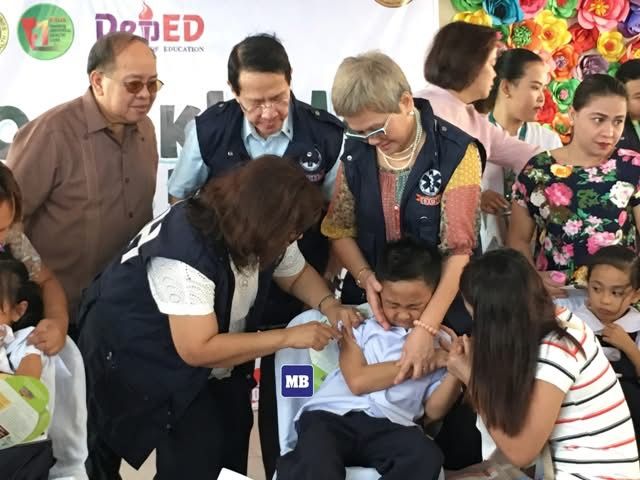DOH warns of possible disease outbreaks if vaccination rates remain low
By Jel Santos

The Department of Health (DOH) on Thursday, Jan. 30, has warned that the Philippines could see outbreaks of preventable diseases if immunization rates do not improve, as the country fell far below its 95 percent target for Full Immunization Coverage (FIC) in 2024.
Based on partial and unofficial data from the Field Health Services Information System (FHSIS), the country only achieved 61 percent of the target, with 1,459,353 children receiving complete doses of routine vaccines as of Dec. 31, 2024.
Health Assistant Secretary for the Public Health Services Cluster Farwa Hombre cited vaccine hesitancy as the main reason for the low immunization rate.
“Actually, maraming reason kung bakit. Ang pinaka main reason [is] the fear of the vaccine. There are a lot of anti-vaxxers right now (Actually, there are many reasons why. The main reason is the fear of the vaccine. There are a lot of anti-vaxxers right now),” she said in an ambush interview at the Manila Hotel during the sidelines of the National Immunization Summit.
She warned that failure to meet the 95 percent target could lead to the resurgence of diseases that had been previously controlled.
“Magkakaroon po tayo ng outbreak po nung mga sakit na dapat po ay na-eradicate na po natin. Kagaya na lamang po ng polio vaccine. Matagal na pong may bakuna… Kung hindi po natin mapapabakunahan ang ating mga anak ay muling babalik po ito (We will have an outbreak of diseases that should have already been eradicated, such as polio. There has been a vaccine for a long time… If we do not get our children vaccinated, these diseases will return),” she said.
Misinformation, impact of Dengvaxia
Hombre acknowledged that the Dengvaxia controversy has contributed to the decline in public trust in vaccines.
“Yes, may effect po ‘yung doon sa Dengvaxia. Pero kagaya po ng sinabi namin, ito pong mga bakuna na binibigay po ng National Immunization Program ay matagal na po nating binibigay (Yes, Dengvaxia had an effect. But as we have said, the vaccines provided under the National Immunization Program have been administered for a long time),” she said.
She emphasized that other vaccines under the National Immunization Program (NIP) have long been proven safe and effective.
“Our vaccines are safe and effective. It’s been there for the longest time. So we urge the public to get vaccinated especially the young ones dahil nga napatunayan na po natin for the longest time na it is safe and effective (because it has long been proven to be safe and effective),” she added.
As such, Hombre pointed to misinformation spread by anti-vaxxers on social media as a significant challenge in convincing parents to have their children vaccinated.
“Because of social media, may mga nababasa sila ngayon na nagko-contradict sa tinuturo natin… Mas naniniwala po sila sa fake news (Because of social media, they now read things that contradict what we teach… They believe fake news more),” she said.
To address this, the DOH said it is intensifying health education and promotions, working with social media platforms to take down vaccine-related misinformation, and coordinating with agencies to go after those spreading false information.
“We are in coordination with [social media platforms]… nagbibigay kami ng report or advisory as well. And then we also coordinate with our social media platforms to take down those fake news (We are in coordination with [social media platforms]… We also provide reports or advisories. And then we also coordinate with our social media platforms to take down those fake news),” she said.
Logistical challenges, global vaccine shortages
The DOH official admitted that vaccine distribution remains a challenge, given the country’s archipelagic geography and global vaccine supply issues.
“We have challenges because we are an archipelago. But we’re doing our part para po ma-distribute ang mga gamot na ito (in order to distribute these medicines),” she said.
Hombre assured the public that the DOH is working closely with UNICEF, WHO, and other stakeholders to ensure vaccines reach the communities that need them.
“We try our best na hindi ma-zero ang ating mga vaccine (We try our best to ensure that our vaccine supply does not run out),” she added, noting that the government is directly coordinating with manufacturers to address shortages.
Call for parent’s cooperation
The health department reiterated the importance of parental cooperation in ensuring children’s protection against vaccine-preventable diseases.
“Napakahalaga po ng kooperasyon ng bawat magulang. Myself, I’m a parent din po. So kung hindi po natin papayagan na mabakunahan ang ating mga anak, nilalagay po natin sila sa kapahamakan, sa mga sakit na dapat po ay naiiwasan natin gamit ang bakuna (The cooperation of every parent is very important. Myself, I’m also a parent. So if we do not allow our children to be vaccinated, we are putting them at risk of diseases that we should be preventing with vaccines),” Hombre said.